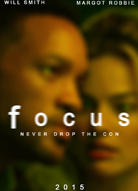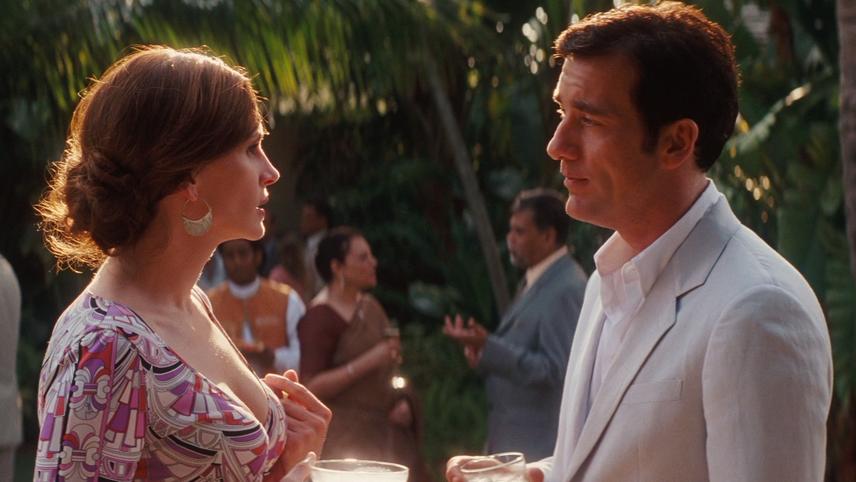 Tim here. Tomorrow sees the release of Focus, a romantic drama about two con artists, played by Will Smith and Margot Robbie. Time will tell if it finds its audience – the critics are steadfastly ambivalent – but I would at least argue on its behalf, sight-unseen, that it's already gotten at least one thing right. There's a slick likeability to any generally good con artist picture, which openly confess to the thing that most movies try to hide at least somewhat: the reason we watch them is to be told enthralling lies. We go to the movies in the specific hope of being conned, and never more so than in the case of romances, which in Hollywood's view are games of people trying to trick other people into falling in love with them, while tricking us into believing that all these contrivances are true and meaningful instead of just skilled craftsmanship. I'm hoping against hope that Focus ends up being really great.
Tim here. Tomorrow sees the release of Focus, a romantic drama about two con artists, played by Will Smith and Margot Robbie. Time will tell if it finds its audience – the critics are steadfastly ambivalent – but I would at least argue on its behalf, sight-unseen, that it's already gotten at least one thing right. There's a slick likeability to any generally good con artist picture, which openly confess to the thing that most movies try to hide at least somewhat: the reason we watch them is to be told enthralling lies. We go to the movies in the specific hope of being conned, and never more so than in the case of romances, which in Hollywood's view are games of people trying to trick other people into falling in love with them, while tricking us into believing that all these contrivances are true and meaningful instead of just skilled craftsmanship. I'm hoping against hope that Focus ends up being really great.
While we wait to find out, I'd like to take you back in time to the last great con artist love story (if we skip over American Hustle, which has other goals in mind), the wantonly under-appreciated Duplicity from 2009. It was writer-director Tony Gilroy's follow-up to his Oscar-nominated Michael Clayton, transposing that film's world of corporate espionage and skullduggery into the frame of a fizzy romantic comedy. It was also the second film to pair Julia Roberts and Clive Owen as a pair of sniping lovers after the acidic "everybody hates everybody" drama Closer. And Duplicity tanked, and was widely unloved, and even six years later, those facts still break my heart a little bit.

Duplicity is a big bowl of candy: it's sweet, it gives you a rush, and it's unhealthy to have it all the time. But I love it anyway. The film's primary aim is to be as breezy and mindless as anything with so many hairpin turns in its plot could possibly dare to be. Unlike Michael Clayton, where puzzling out the details of the story and being thrilled in the process is the whole point, Duplicity is entirely about watching move stars dance around a complicated scenario and fence with each other. It's certainly a romcom first: the main driving force is that Roberts and Owen's characters (Claire and Ray, but in movie star vehicles, we don't usually think of character names) want to have sex with each other, but at any given point, neither of them is sure whether they're both on the same side.
It's the same basic engine as goes into any film of the genre: why aren't these two hot people hooking up yet? Some people solve that by ginning up ridiculous misunderstandings that could be solved with a single phone call; Gilroy does it by making both of his characters professional liars who are double and triple-crossing their respective employers. Which has the benefit of novelty on its side, anyway. It also means that following along as the plot unfolds isn't quite so by-the-numbers as it usually is in romantic comedies, for the DNA of the con artist genre means that we don't get to be quite as sure that they'll end up together, or what "winning" ends up meaning.
 The whole thing only works because it has effortlessly likeable people playing the leads: even when they're being horrible to each other (and that happens quite a bit), neither Roberts nor Owen are so nasty as people that it acts as a turn-off. Quite the opposite, in fact: part of the film's conceit is that the two characters are so mired in their world of deception and hidden identity that it's exactly that lack of trust that ends up arousing them and fueling their sexual desire, like the classic "sexy thieves" screwball comedy Trouble in Paradise from 1932, given more acerbic tartness through the 2000s-style metallic sleekness of the cinematography (by the invaluable Robert Elswit) and the cynicism that Gilroy can't help but feel about his characters' milieu.
The whole thing only works because it has effortlessly likeable people playing the leads: even when they're being horrible to each other (and that happens quite a bit), neither Roberts nor Owen are so nasty as people that it acts as a turn-off. Quite the opposite, in fact: part of the film's conceit is that the two characters are so mired in their world of deception and hidden identity that it's exactly that lack of trust that ends up arousing them and fueling their sexual desire, like the classic "sexy thieves" screwball comedy Trouble in Paradise from 1932, given more acerbic tartness through the 2000s-style metallic sleekness of the cinematography (by the invaluable Robert Elswit) and the cynicism that Gilroy can't help but feel about his characters' milieu.
Other than the fact that mainstream movies about adults who don't feel bad for liking to have sex are a longstanding rarity in American filmmaking, Duplicity certainly isn't very deep or thematically nuanced. It's a lark, a black-hearted lark maybe, but still mostly concerned with being frothy and fun. To my mind, it's absolutely and in every way a success in that regard, a capital-M Movie of a deeply pleasing, shallow sort. And it's just as satisfying now as it was a half of a decade ago.
That's my favorite romance between con artists, anyway. What's yours? Share it in the comments.